Yuxuan Yao
Merging Beyond: Streaming LLM Updates via Activation-Guided Rotations
Feb 03, 2026Abstract:The escalating scale of Large Language Models (LLMs) necessitates efficient adaptation techniques. Model merging has gained prominence for its efficiency and controllability. However, existing merging techniques typically serve as post-hoc refinements or focus on mitigating task interference, often failing to capture the dynamic optimization benefits of supervised fine-tuning (SFT). In this work, we propose Streaming Merging, an innovative model updating paradigm that conceptualizes merging as an iterative optimization process. Central to this paradigm is \textbf{ARM} (\textbf{A}ctivation-guided \textbf{R}otation-aware \textbf{M}erging), a strategy designed to approximate gradient descent dynamics. By treating merging coefficients as learning rates and deriving rotation vectors from activation subspaces, ARM effectively steers parameter updates along data-driven trajectories. Unlike conventional linear interpolation, ARM aligns semantic subspaces to preserve the geometric structure of high-dimensional parameter evolution. Remarkably, ARM requires only early SFT checkpoints and, through iterative merging, surpasses the fully converged SFT model. Experimental results across model scales (1.7B to 14B) and diverse domains (e.g., math, code) demonstrate that ARM can transcend converged checkpoints. Extensive experiments show that ARM provides a scalable and lightweight framework for efficient model adaptation.
Activation-Guided Consensus Merging for Large Language Models
May 20, 2025Abstract:Recent research has increasingly focused on reconciling the reasoning capabilities of System 2 with the efficiency of System 1. While existing training-based and prompt-based approaches face significant challenges in terms of efficiency and stability, model merging emerges as a promising strategy to integrate the diverse capabilities of different Large Language Models (LLMs) into a unified model. However, conventional model merging methods often assume uniform importance across layers, overlooking the functional heterogeneity inherent in neural components. To address this limitation, we propose \textbf{A}ctivation-Guided \textbf{C}onsensus \textbf{M}erging (\textbf{ACM}), a plug-and-play merging framework that determines layer-specific merging coefficients based on mutual information between activations of pre-trained and fine-tuned models. ACM effectively preserves task-specific capabilities without requiring gradient computations or additional training. Extensive experiments on Long-to-Short (L2S) and general merging tasks demonstrate that ACM consistently outperforms all baseline methods. For instance, in the case of Qwen-7B models, TIES-Merging equipped with ACM achieves a \textbf{55.3\%} reduction in response length while simultaneously improving reasoning accuracy by \textbf{1.3} points. We submit the code with the paper for reproducibility, and it will be publicly available.
Unlocking Efficient Long-to-Short LLM Reasoning with Model Merging
Mar 26, 2025



Abstract:The transition from System 1 to System 2 reasoning in large language models (LLMs) has marked significant advancements in handling complex tasks through deliberate, iterative thinking. However, this progress often comes at the cost of efficiency, as models tend to overthink, generating redundant reasoning steps without proportional improvements in output quality. Long-to-Short (L2S) reasoning has emerged as a promising solution to this challenge, aiming to balance reasoning depth with practical efficiency. While existing approaches, such as supervised fine-tuning (SFT), reinforcement learning (RL), and prompt engineering, have shown potential, they are either computationally expensive or unstable. Model merging, on the other hand, offers a cost-effective and robust alternative by integrating the quick-thinking capabilities of System 1 models with the methodical reasoning of System 2 models. In this work, we present a comprehensive empirical study on model merging for L2S reasoning, exploring diverse methodologies, including task-vector-based, SVD-based, and activation-informed merging. Our experiments reveal that model merging can reduce average response length by up to 55% while preserving or even improving baseline performance. We also identify a strong correlation between model scale and merging efficacy with extensive evaluations on 1.5B/7B/14B/32B models. Furthermore, we investigate the merged model's ability to self-critique and self-correct, as well as its adaptive response length based on task complexity. Our findings highlight model merging as a highly efficient and effective paradigm for L2S reasoning, offering a practical solution to the overthinking problem while maintaining the robustness of System 2 reasoning. This work can be found on Github https://github.com/hahahawu/Long-to-Short-via-Model-Merging.
From System 1 to System 2: A Survey of Reasoning Large Language Models
Feb 25, 2025Abstract:Achieving human-level intelligence requires refining the transition from the fast, intuitive System 1 to the slower, more deliberate System 2 reasoning. While System 1 excels in quick, heuristic decisions, System 2 relies on logical reasoning for more accurate judgments and reduced biases. Foundational Large Language Models (LLMs) excel at fast decision-making but lack the depth for complex reasoning, as they have not yet fully embraced the step-by-step analysis characteristic of true System 2 thinking. Recently, reasoning LLMs like OpenAI's o1/o3 and DeepSeek's R1 have demonstrated expert-level performance in fields such as mathematics and coding, closely mimicking the deliberate reasoning of System 2 and showcasing human-like cognitive abilities. This survey begins with a brief overview of the progress in foundational LLMs and the early development of System 2 technologies, exploring how their combination has paved the way for reasoning LLMs. Next, we discuss how to construct reasoning LLMs, analyzing their features, the core methods enabling advanced reasoning, and the evolution of various reasoning LLMs. Additionally, we provide an overview of reasoning benchmarks, offering an in-depth comparison of the performance of representative reasoning LLMs. Finally, we explore promising directions for advancing reasoning LLMs and maintain a real-time \href{https://github.com/zzli2022/Awesome-Slow-Reason-System}{GitHub Repository} to track the latest developments. We hope this survey will serve as a valuable resource to inspire innovation and drive progress in this rapidly evolving field.
Reflective Gaussian Splatting
Dec 26, 2024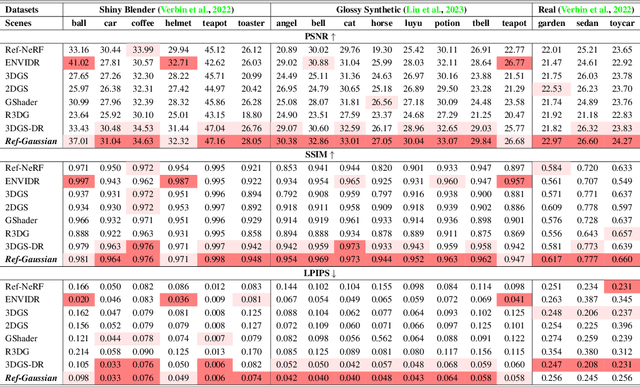

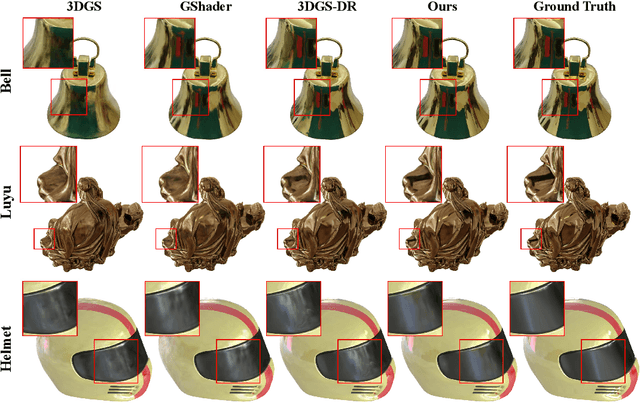

Abstract:Novel view synthesis has experienced significant advancements owing to increasingly capable NeRF- and 3DGS-based methods. However, reflective object reconstruction remains challenging, lacking a proper solution to achieve real-time, high-quality rendering while accommodating inter-reflection. To fill this gap, we introduce a Reflective Gaussian splatting (\textbf{Ref-Gaussian}) framework characterized with two components: (I) {\em Physically based deferred rendering} that empowers the rendering equation with pixel-level material properties via formulating split-sum approximation; (II) {\em Gaussian-grounded inter-reflection} that realizes the desired inter-reflection function within a Gaussian splatting paradigm for the first time. To enhance geometry modeling, we further introduce material-aware normal propagation and an initial per-Gaussian shading stage, along with 2D Gaussian primitives. Extensive experiments on standard datasets demonstrate that Ref-Gaussian surpasses existing approaches in terms of quantitative metrics, visual quality, and compute efficiency. Further, we show that our method serves as a unified solution for both reflective and non-reflective scenes, going beyond the previous alternatives focusing on only reflective scenes. Also, we illustrate that Ref-Gaussian supports more applications such as relighting and editing.
IRGS: Inter-Reflective Gaussian Splatting with 2D Gaussian Ray Tracing
Dec 20, 2024Abstract:In inverse rendering, accurately modeling visibility and indirect radiance for incident light is essential for capturing secondary effects. Due to the absence of a powerful Gaussian ray tracer, previous 3DGS-based methods have either adopted a simplified rendering equation or used learnable parameters to approximate incident light, resulting in inaccurate material and lighting estimations. To this end, we introduce inter-reflective Gaussian splatting (IRGS) for inverse rendering. To capture inter-reflection, we apply the full rendering equation without simplification and compute incident radiance on the fly using the proposed differentiable 2D Gaussian ray tracing. Additionally, we present an efficient optimization scheme to handle the computational demands of Monte Carlo sampling for rendering equation evaluation. Furthermore, we introduce a novel strategy for querying the indirect radiance of incident light when relighting the optimized scenes. Extensive experiments on multiple standard benchmarks validate the effectiveness of IRGS, demonstrating its capability to accurately model complex inter-reflection effects.
Determine-Then-Ensemble: Necessity of Top-k Union for Large Language Model Ensembling
Oct 03, 2024



Abstract:Large language models (LLMs) exhibit varying strengths and weaknesses across different tasks, prompting recent studies to explore the benefits of ensembling models to leverage their complementary advantages. However, existing LLM ensembling methods often overlook model compatibility and struggle with inefficient alignment of probabilities across the entire vocabulary. In this study, we empirically investigate the factors influencing ensemble performance, identifying model performance, vocabulary size, and response style as key determinants, revealing that compatibility among models is essential for effective ensembling. This analysis leads to the development of a simple yet effective model selection strategy that identifies compatible models. Additionally, we introduce the \textsc{Uni}on \textsc{T}op-$k$ \textsc{E}nsembling (\textsc{UniTE}), a novel approach that efficiently combines models by focusing on the union of the top-k tokens from each model, thereby avoiding the need for full vocabulary alignment and reducing computational overhead. Extensive evaluations across multiple benchmarks demonstrate that \textsc{UniTE} significantly enhances performance compared to existing methods, offering a more efficient framework for LLM ensembling.
MR-BEN: A Comprehensive Meta-Reasoning Benchmark for Large Language Models
Jun 20, 2024
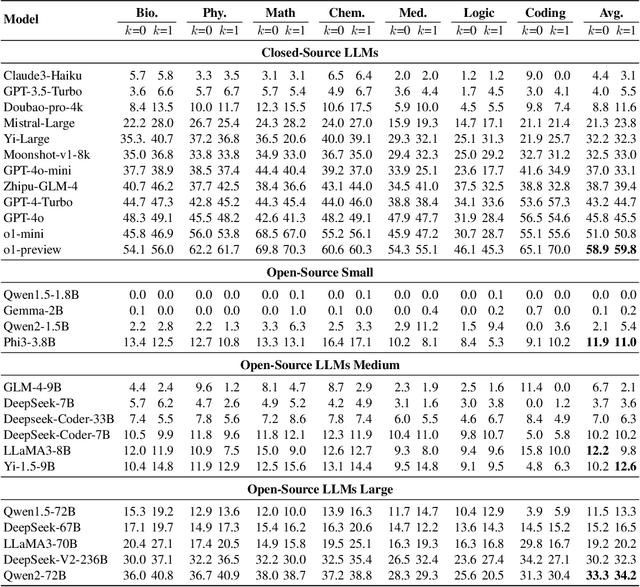
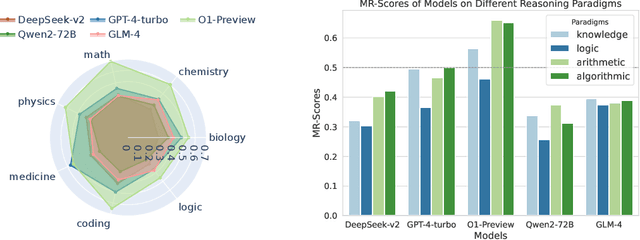

Abstract:Large language models (LLMs) have shown increasing capability in problem-solving and decision-making, largely based on the step-by-step chain-of-thought reasoning processes. However, it has been increasingly challenging to evaluate the reasoning capability of LLMs. Concretely, existing outcome-based benchmarks begin to saturate and become less sufficient to monitor the progress. To this end, we present a process-based benchmark MR-BEN that demands a meta reasoning skill, where LMs are asked to locate and analyse potential errors in automatically generated reasoning steps. MR-BEN is a comprehensive benchmark comprising 5,975 questions collected from human experts, covering various subjects such as physics, chemistry, logic, coding, and more. Through our designed metrics for assessing meta-reasoning on this benchmark, we identify interesting limitations and weaknesses of current LLMs (open-source and closed-source models). For example, open-source models are seemingly comparable to GPT-4 on outcome-based benchmarks, but they lag far behind on our benchmark, revealing the underlying reasoning capability gap between them. Our dataset and codes are available on https://randolph-zeng.github.io/Mr-Ben.github.io/.
Privacy in LLM-based Recommendation: Recent Advances and Future Directions
Jun 03, 2024Abstract:Nowadays, large language models (LLMs) have been integrated with conventional recommendation models to improve recommendation performance. However, while most of the existing works have focused on improving the model performance, the privacy issue has only received comparatively less attention. In this paper, we review recent advancements in privacy within LLM-based recommendation, categorizing them into privacy attacks and protection mechanisms. Additionally, we highlight several challenges and propose future directions for the community to address these critical problems.
Learning From Correctness Without Prompting Makes LLM Efficient Reasoner
Mar 28, 2024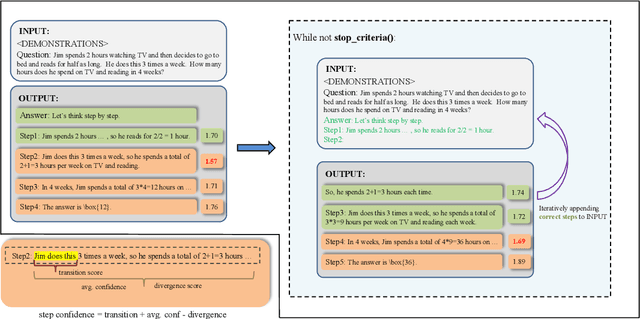



Abstract:Large language models (LLMs) have demonstrated outstanding performance across various tasks, yet they still exhibit limitations such as hallucination, unfaithful reasoning, and toxic content. One potential approach to mitigate these issues is learning from human or external feedback (e.g. tools). In this paper, we introduce an intrinsic self-correct reasoning framework for LLMs that eliminates the need for human feedback, external tools, and handcraft prompts. The proposed framework, based on a multi-step reasoning paradigm \textbf{Le}arning from \textbf{Co}rrectness (\textsc{LeCo}), improves reasoning performance without needing to learn from errors. This paradigm prioritizes learning from correct reasoning steps, and a unique method to measure confidence for each reasoning step based on generation logits. Experimental results across various multi-step reasoning tasks demonstrate the effectiveness of the framework in improving reasoning performance with reduced token consumption.
 Add to Chrome
Add to Chrome Add to Firefox
Add to Firefox Add to Edge
Add to Edge